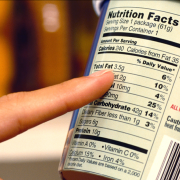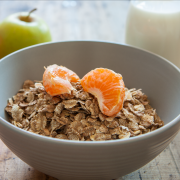
In one of the most heated debates in nutrition history, the low carbohydrate diet is in a head-to-head battle for contender of the healthiest diet. This debates takes place against the backdrop of rising rates of obesity and chronic disease in South Africa, creating an avalanche of low carb diet regimes and foods and on the market.
What is a low carb diet?
Along with fat and protein, carbohydrates are part of the three food groups essential to human health. Generally, the recommended intake of carbohydrates ranges from 45 - 65% of total daily energy. Diets with less than 45% of energy from carbohydrates are called low carbohydrate diets. There are some popular low carbohydrate diets with even more extreme restriction, like the ketogenic diet of 5% total energy from carbohydrates (about the same as one slice of bread). On a low carbohydrate diet, fat is the favourite food group while carbohydrates take a back seat. Eating less carbs on this diet would mean favouring more fat in the diet while choosing less starchy foods (e.g. bread, rice, pasta, oats), fruit, starchy vegetables (e.g. potatoes, sweet potatoes, corn), sugar and sugary foods, and also the less obvious sources of carbohydrates like legumes (e.g. beans, chickpeas, lentils) and dairy.
What happens when you cut the carbs?
We know that a diet too high in energy (calories/kilojoules), irrespective of whether the energy source is from carbohydrate, fat or protein, will cause weight gain. One of the inherent mechanisms of weight loss on low carbohydrate diets is that when you cut back on carbs in the diet, you naturally cut back on the energy consumed, too. This is because, as Dr David Katz so eloquently says, “Everything from lentils to lollipops is a source of carbs.” We then need to ask the question whether the weight loss is because of cutting down on carbohydrates per se or because you simply restricted energy with so many foods are off limits. In the case of removing carbohydrates, you remove the energy from the carb-rich food you otherwise would have eaten, and, if you don’t replace this energy, it means you will eat less through the day and lose weight. And since the carbohydrate rich foods tend to be those we overeat the most (think highly refined, processed while flour like white bread, white wraps, pizzas, tramezzinis, and sugary foods such as cakes, pastries, muffins, scones, croissants, sweets, chocolates, etc), cutting out these high energy, nutrient poor foods are no doubt a win for our health and for the waist line.
Are there any long-term concerns with a low carb diet?
It is logical that if you remove or restrict a food group, you consequently remove or restrict the nutrient that is rich in that food group. Nutrients like thiamine, folate, magnesium, potassium, and vitamins A, E and B6 may start to be missing in your diet if you don’t eat some of the heathier carbs. The brain, nervous system, and red blood cells exclusively use glucose (the breakdown product of carbohydrates) for energy, so even on a low carb diet it is vital that we consume some carbohydrates as part of our diet. These can be in the form of healthier, high fibre, less refined carbohydrates such as oats, wholewheat bread, wholegrain pasta, corn, and all fruit and vegetables. Added to this, these foods offer a host of health benefits such as reduced risk of diabetes, cancer, and heart disease, and optimal gut heath. This is from powerful nutrient components of the healthy carbohydrates such as phytonutrients, polyphenols, antioxidants, and fibre.
The other challenge is the misbelief that everything low carb is good for weight loss. It is important to know that just because a products is low in carbohydrates does not necessarily imply that it is low in energy (kilojoules or calories). To illustrate this point, look at the food labels of various low carb products compared to standard//traditional carbohydrate products. The energy value of many of these products are often higher than the traditional/normal version as the carbohydrate is replaced with fat, such as wheat flour being replaced with almond or coconut flour, meaning you need to eat less of it.
So, are there better carb choices?
Just like there are healthier fats that are best over less healthy fats, there are better carbohydrate choices and less ideal choices. Healthy carbohydrates include all plant foods in their whole form that undergo minimal processing, refining and milling such as fresh fruit, vegetables, wholegrain starches, legumes (e.g. beans, chickpeas, lentils), wild/brown rice, pearl wheat, bulgur wheat, corn, rolled oats, and quinoa. These carb-rich foods are an important source of vital vitamins, minerals, and fibre for a healthy gut.
What happens when you eat more fat on a low carb diet?
We definitely need fats but the type of fat we chose needs more focus. Strong evidence supports that monounsaturated fats (e.g. avocados, olives, nuts, and nut butters) are healthier than saturated fats e.g. (butter, cream, bacon, fatty meat, processed meat, chicken skin, and coconut oil) as these fats protect the heart, improve cholesterol levels, strengthen the immune system, and lower inflammation levels in the body. Recent evidence supports the role essential fatty acids such as omega-3s in illness such as Alzheimer’s and dementia.
Fats are categorised by the length of the fatty acid chain: the more carbon atoms in the fat molecule, the longer the chain length is. Because of the longer length of the saturated fat molecule, this type of fat has the ability to tightly pack into membranes of our cells and this can cause adverse health benefits. As a result, saturated fats should be limited in the diet to less than 10% of total dietary energy per day. That said, we still want to include the right kinds of fats in our diet. Intentionally limiting heart healthy fats like nuts, seeds, avocados, olive oil, and omega-3s can actually negatively influence our health. The Academy of Nutrition and Dietetics recognises the role of healthy fats in the diet and recommend that we include the fat that benefit health (olives, avocado, nuts, seeds and their oils) and a reduce those fats that increase risk of disease (animal fats like fat on meat, chicken skin, and full cream dairy, and coconut oil). Strong evidence shows a direct relationship between high saturated fat diets and raised LDL, the bad type of cholesterol.
In summary, a low carbohydrate diet includes no unhealthy carbohydrates while saying yes to highly nutritious versions of fats and small amounts of portion-controlled complex, minimally processed carbohydrates (e.g. fruit, starchy vegetables, legumes, wholegrain high fibre bread, brown rice, whole-wheat pasta, oats). In the same way, emphasis should be on favouring the monounsaturated fats in olive oil, nuts and seeds, and fatty fish, and less saturated fat from red and processed meat.
The FitChef Low Carb Difference
The FitChef meals and smoothies are made from portion-controlled amounts of only the best quality carbs such as fruit, vegetables, and wholegrain, high fibre starches like brown rice, wholewheat pasta and quinoa. Most FitChef meals are 300g in size, while a few are 250g to keep the carbohydrates in the meal low. Bulk up your FitChef meal with extra salad, vegetables and healthy fats like avocado and olive oil if you’re still hunger. The added fibre from low energy (and low carb) vegetables will keep you fuller for longer and the healthy fats will help satisfy your taste buds. This is all part of our commitment to providing food without added preservatives, additives, added sugar or artificial sugars, colourants, flavourants with our ingredients as close to the natural state as possible.
- Beef Goulash
- Ostrich Potjie
- Fillet Steak
- Beef and Bacon Burger
- Hake Napolitana
- Beetroot Soup
- Chunky vegetable Soup
- Tomato Soup
- Winter veg Soup
- Chicken Snacker
- Droewors
- Biltong Slices
- Biltong Sticks
- Pine Nibbles
- Mixed Nuts
- Chocolate Brownie
- Trail Mix
- Jebb SA. Conference on “Carbohydrates in health: friends or foes’ Symposium.
- New perspectives on carbohydrates and health. Proceedings of the Nutrition Society. 2015;74:215-220. 2. Katz DL and Meller S. Can we say which diet is best for health? Annual review of public health, 2014; 35: 83-103.
- Position of the Academy of Nutrition and Dietetics: Dietary fatty acids for healthy adults. Journal of the Academy of Nutrition and Dietetics. 2014;114:136-153.
- Position of the Academy of Nutrition and Dietetics: Health implications of dietary fibre. Journal of the Academy of Nutrition and Dietetics. 2015;115:1861-1870. 5. Scientific Advisory Committee on Nutrition. Carbohydrates and Health. 2015. Public Health, London.

 No added or artificial sugars
No added or artificial sugars The cleanest ingredient labels
The cleanest ingredient labels














